体验商务英语2-Unit_2
体验商务英语第二UnitTravel

I think hotels will need to improve …t…he…ir …st…an…da…rd…s….
in general. There are some very good hotels already,
Air rage
negative meaning? Use a good dictionary to help you.
rage
misbehavior
frustration
optimum √
din √ valuable √
complaints
disruptive
dangerous
Starting up
Which of these irritate you most?
Vocabulary A Match the words and phrases below which have
British and
the same meaning. For each pair decide which is
British and American English
B Work in pairs. Use words or phrases in American English from Exercise A to complete the text below.
My last overseas business trip was a nightmare from start to finish. First of all there was a delay on the way to the airport as there was an accident on the __fr_e_e_w_a_y___. When I got there I found the lower level of the airport p__a_rk_i_n_g_l_o_t_ was flooded. Next my _c_a_r_r_y_-o_n__lu_g__g_a_g_e_ was too big and heavy so I had to check it in. When we arrived the __s_u_b_w_a_y__ was closed and there were no cabs at all. After a long time trying to read the __s_c_h_e_d_u_le___ and waiting for forty minutes, we finally got a bus _d__o_w_n_t_o_w_n__ and found the hotel, but the __e_le_v_a_t_o_r__ wasn’t working and our rooms were on the fifth floor.
体验商务英语2-Unit2

do shopping online? What problems are they? What are the advantages and disadvantages
of doing shopping online?
IBM advertisement
Bad ideas don’t get better online The main idea: a bad business idea will not work
Unit 2
Selling Online
Learning Objectives
Talking about selling online Vocabulary related to selling online Negotiating techniques Problem-solving abilities Business writing techniques by writing
What’s B2B?
Business to business or B2B refers to electronic commerce between businesses rather than between a business and a consumer(B2C).
B2B businesses often deal with hundreds or even thousands of other businesses, either as customers or suppliers. Carrying out these transactions electronically provides vast competitive advantages over traditional methods.
体验商务英语第2课U2课件

Reading Describing your routine
D Decide whether these statements are true or false.
Many people think Ghosn is Japanese. False Ghosn speaks three foreign languages. False He lives in Europe. True He often travels between Europe and Asia. True He meets international customers at weekends. False 6 He has four children. True 1 2 3 4 5
security opportunities boss facilities promotion
helpful
company mobile
holidays
phone facilities
parking
car
sports
hours
Starting up
C Match some word partnerships from Exercise B to their meanings 1 to 6. 1 a lot of money high salary long holiday helpful colleagues travel opportunities
work (work) (work) for a shipping company
6 you can change the times when you start and finish work flexible hours
体验商务英语综合教程 第二答案Unit Travel

B Work in pairs. Use words or phrases in American English from Exercise A to complete the text below.
My last overseas business trip was a nightmare from start to finish. First of all there was a delay on the way to the airport as there was an accident on the __fr_e_e_w__a_y__. When I got there I found the lower level of the airport p__a_rk_i_n_g__lo_t_ was flooded. Next my _c_a_r_r_y_-o_n__lu__g_g_a_g_e_ was too big and heavy so I had to check it in. When we arrived the __s_u_b_w_a_y__ was closed and there were no cabs at all. After a long time trying to read the __s_c_h_e_d_u_le___ and waiting for forty minutes, we finally got a bus _d__o_w_n_t_o_w_n__ and found the hotel, but the __e_le_v_a_t_o_r__ wasn’t working and our rooms were on the fifth floor.
体验商务英语综合教程2 unit2 Case study

Our advertising budget is 300,000 – at least!
Share costs on a 70%/30% basis (70% Lifetime Holidays ) Media: include radio advertising. Investment and profits 50%/50%basis. We suggest that your company manages the project because of your greater experience and knowledge of selling online.
We reach an agreement on a joint venture!
We need a four-year contract. Our destinations is offer all the holidays in both companies’. Our customers aim at all age groups. We can provide car hire and insurance services as they are very profitable for your company. Our advertising budget is 250,000 pounds. Share costs on 50/50 basis. Media :Mail shots and press adverting. Investment and profits 50%/50% basis. We decided that we manages the project together.
体验商务英语综合教程_第二答案Unit__Travel

American English
British English and which is American English.
1 subway 2 city centre 3 carry-on baggage 4 one way 5 return 6 freeway 7 rest room 8 elevator 9 coach class 10 timetable 11 car park
Perhaps, particularly in the area of …ac…co…m…m.…od…at…io…n .,
I think hotels will need to improve …t…he…ir …st…an…da…rd…s….
in general. There are some very good hotels already,
quality √
harm irritability
criticize dissatisfaction
Language review
Talking about future
plans
Useful ways to talk about the future
• Use ‘will + verb’ to express a voluntary action or promise
but I think more hotels will provide ……fa…c…ilit…ie…s … for
business people … perhaps some …s…pe…ci…fic... facilities
for …bu…si…ne…ss…w…om…e…n
Reading A Answer these questions before you read the article.
体验商务英语第二版PPTUnitTravel

Starting up B Choose the correct word from the box to complete
the following list of things which irritate people when flying.
seats trolleys queues luggage room cancellations food jet
Air rage
negative meaning? Use a good dictionary to help you.
rage
misbehavior
frustration
optimum √
disorientation
concern √ valuable √
complaints
disruptive
dangerous
American English
British English and which is American English.
1 subway 2 city centre 3 carry-on baggage 4 one way 5 return 6 freeway 7 rest room 8 elevator 9 coach class 10 timetable 11 car park
Perhaps, particularly in the area of …ac…co…m…m.…od…at…io…n .,
I think hotels will need to improve …t…he…ir…st…an…da…rd…s….
in general. There are some very good hotels already,
体验商务英语综合教程第二答案UnitTravel

priorities
mentions from the list below.
• Good organization √
• Regular transport
• Balancing cost with
comfort √
• Easy booking
• Being patient √
• Airline food
Best: ‘great hotel with beautiful towels and beautiful bathrooms and nice soft bed, and good sports facilities.’ ‘the Virgin lounge, I think. That’s a good experience with all the high tech things. I like that.’
quality √
harm irritability
criticize dissatisfaction
Language review
Talking about future
plans
Useful ways to talk about the future
• Use ‘will + verb’ to express a voluntary action or promise
Worst: ‘things out of your control’ such as bad accommodation and delayed or cancelled flights.
Listening
Business traveler’s priorities
E Listen to what Stephanie says about future business travel and complete her prediction below.
Unit-2-Selling-online 体验商务英语综合教程2(课堂PPT)

Online shopping
tips
Know who you’re dealing with. Anyone can set up shop online under almost any name. Confirm the online seller’s physical address and phone number in case you have questions or problems. If you get an email or pop-up message while you’re browsing that asks for financial information, don’t reply or click on the link in the message. Legitimate companies don’t ask for this information via email.
Know exactly what you’re buying. Read the seller’s description of the product closely, especially the fine print. Words like “refurbished,” “vintage,” or “close-out” may indicate that the product is in less-than-mint condition, while name-brand items with “too good to be true” prices could be counterfeits.
Reading (Virtual Pocket
Money)
Listening (online selling vs. high street selling)
体验商务英语综合教程2 教案
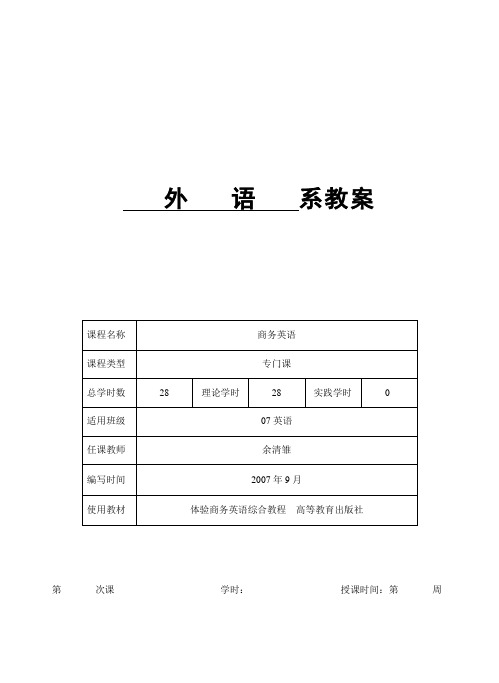
外语系教案第次课学时:授课时间:第周Context: Unit 1Title: IntroductionsThe tone of a business relationship can be set by an initial introduction. It is important to make a good impression right from the first handshake. When meeting businesspeople for the first time, is it better to be formal or informal? If in doubt, advise students to adopt a more formal approach. Here are some points to remember when making business introductions in English-speaking Western countries:a.Introduce businesspeople in order of professional rank –the person of highestauthority is introduced to others in the group in descending order, depending on their professional position.b.When possible, stand up when introductions are being made.c.If clients are present, they should be introduced first.d.The same and title of the person being introduced is followed by the name and titleof the other person.PROCEDURESLesson 1Starting upSs listen to four businesspeople and match the speakers to their business cards. Vocabulary 1: Job titlesSs list word as job titles or departments. Then Ss talk about their jobs or studies. Vocabulary 2: NationalitiesSs match countries and nationalities.Reading: Describing peopleThis reading section can be completed in two parts. Ss can start preparatory work on the article about Phil Knight, the founder and CEO of Nike, and complete Exercise A. Lesson 2Reading: Describing peopleSs complete more detailed comprehension questions about Phil Knight (Exercise B and C). Language focus 1: to beSs are introduced to positive and negative forms of the verb to be.Language focus 2: a/an with jobs; wh- questionsSs look at the use of a/an before vowels and consonants and are introduced to what, who and where question words.Lesson 3Listening: Talking about yourselfSs listen to three people talking about their jobs.Skills: Introducing yourself and othersSs listen to three conversations where people introduce themselves and others. They then practice introductions.Lesson 4Case study: Aloha in HawaiiSs find out information about people at a conference.WritingSs write an e-mail about two people from the conference.第次课学时:授课时间:第周Context: Unit 2Title:Work and leisureIt has never been easy to balance work and leisure. During the late twentieth century the concept of a job for life was largely replaced by the short-term contracts favored by the enterprise culture. Some found themselves with too much free time n their hands when company restructures led to redundancies. Others saw leisure time shrink and working hours increase in exchange for greater financial rewards. The British TUC estimates that, despite European Union legislation, 4 million people in the UK work more than 48 hours per week and 1 in 25 work over 60 hours. It is thought that managers and professional staff work the longest hours.PROCEDURESLesson 1Starting upSs listen to four people talking about what they want from work and make word partnerships.Vocabulary 1: Days, months, datesSs practice days, months and dates and use the prepositions in, at and on with time phrases.Lesson 2Reading: Describing your routineSs read an article about the working day of Michael Dell, Chairman of Dell computers. Language focus 1: Present simpleSs look at the present simple to talk about habits and work routines.Vocabulary 2: Leisure activitiesSs use leisure activities, verbs and time phrases to talk about leisure time.Lesson 3Language focus 2: Adverbs and expressions of frequencySs complete exercises using adverbs and expressions of frequency and listen to three people talking about their typical day.Skills: Talking about work and leisureSs match questions and answers about work and leisure and then listen to a conversation about what Tim does at the weekend. Afterwards they talk about their own work and leisure activities.Lesson 4Case study: Independent Film CompanySs role play an interview between Human Resources and unhappy employees of a film company.WritingSs use the information from the case study to list the working conditions they want to change.第次课学时:授课时间:第周Context: Unit 3Title:ProblemsProblems are a fact of life. So problem-solving is an essential life skill both at home and in the office. Many pressurized managers in the modern business world may benefit from training in conflict resolution to resolve disagreements. It is wise to deal with sensitive matters face-to-face. Irate e-mails and memos often contain sentiments we would modify if speaking to the person directly. Social psychologist Albert Merabian says that words account for seven percent of communication, tone 38 percent and body language 55 percent. These elements are particularly useful in understanding and resolving potential conflict situation but can be lost in cyber communication. PROCEDURESLesson 1Starting upSs match sentences and problems and listen to five phone calls to identify the product and the problem.Vocabulary: AdjectivesSs look at the adjectives and their opposites and use too and enough.Lesson 2Reading: Dealing with problems at workFour people answer the question: ‘What are the biggest problems facing your company?’Language focus 1: Present simple: negatives and questionsSs match questions and answers, make negative sentences and practice the question forms in a role play.Lesson 3Language focus 2: have gotSs look at the use of have got, haven’t got and Have you got? To talk about possession. Skills: Telephoning: solving problemsSs listen to four phone calls where people talk about problems. Then they role play a phone conversation talking about problems with a product.Lesson 4Case study: Blue HorizonGuests of a holiday company compare their holiday apartments with the holiday brochure and complain to a representative of the company.WritingSs listen to a voice mail and write a telephone message for the manager of Blue Horizon. 第次课学时:授课时间:第周Context: Unit 4Title:TravelAround 1400 BC Polynesians paddled across the open ocean in canoes, serching for new trading partners, and the age of business travel began. The modern businessperson is more likely to choose flying as the quickest way of getting from A to B. Although safer than canoe, this can still pose hazards. Frequent fliers are likely to encounter a number of hurdles that can lead to increased stress levels. First, you have to acturally get on the plane. Most airlines overbook to minimise seat wastage and no-shows. This means that if all the passengers who actually booked seats turn up, there could be a shortage of place. If there are not enough volunteers to give up their seats, then you may find yourself bumped – denied boarding and put on a later flight.PROCEDURESLesson 1Starting upSs talk about things they like and don't like when travelling on business. Vocabulary: Travel detailsSs practise the alphabet and numbers 1-100 and match verbs and travel phrases. Listening: Listening for informationSs listen and answer questions about travel information.Lesson 2Language focus 1: can/ can’tSs put a dialogue into the correct order and then listen to check. Then Ss role play a conversation using can/ can’t.Reading: Business hotelsSs read about facilities in The Tower Hotel.Lesson 3Language focus 2: there is/ there areSs complete sentences using ther is/ there are and carry out a role play about a new job abroad.Skills: Making bookings and checking arrangmentsSs listen and answer questions about booking a hotel room before role playing a similar situation.Lesson 4Case study: Pacific HotelA hotel manager and assistant manager allocate rooms to twelve guests at a small hotel. WritingSs write a fax to one of the guests confirming arrangements.第次课学时:授课时间:第周Context: Unit 5Title:Food and entertainmentFood can communicate complex messages about status, nationally and identity. The fashion for eating out in restaurant was adopted by the upper classes during the French revolution. Most English words relating to eating out are adopted from the French (hotel, café, menu, chef, etc.) including restaurant, which was originally from the French verb meaning ‘to store’. Later, the migrations of the twentieth century proved fertile ground for mingling cuisines and a knowledge of the vast variety on offer is viewed as a mark of modern cosmopolitan taste.PROCEDURESLesson 1Starting upSs talk about the kind of food they like and match dishes and countries. Vocabulary: Eating outSs look at food groups and different parts of a menu.Reading: TippingThis reading section can be completed in two parts. Ss match jobs with places where people work. Then Ss talk about what services they tip before completing a table about which countries tip most often (Exercises A-C).Lesson 2Reading: TippingSs read an article about factors that encourage people to tip and answer comprehension questions (Exercises D-E).Language focus 1: some/anySs correct mistakes using some and any and underline the correct words in a dialogue. Listening: Ordering a mealSs listen to what a man and a woman order in a restaurant.Lesson 3Language focus 2: Countable and uncountable nounsSs identify countable nouns and complete exercises using a lot of, many or much. Skills: EntertainingSs look at language for entertaining visitors in a restaurant and listen and respond to a waiter’s questions.Lesson 4Case study: Which restaurant?Three colleagues decide which restaurants to choose to entertain three important customers.WritingSs write an e-mail inviting a customer to dinner and giving details about the restaurant. 第次课学时:授课时间:第周Context: Unit 6Title:SalesThings have come a long way since the days when peddlers went from door to door selling wares from a pack. Now advertisements pop up as text messages. Goods can be ordered by mall order. We can compare prices, get quotes, check if an item is in stock and place an order without moving away from our computer screen. In some ways the methods o buying and selling have undergone a revolution and in others little has changed since the early 1900s when keywords in sales were service and relationships. A modern sales force uses a mixture of tried and tested techniques and new technology to increase sales. The foundation of modern sales techniques was developed in the 1950s and includes gaining the client’s interest, building desire by showing product features or giving samples, increasing conviction by comparing the product with competitors or using statistics to highlight benefits and, finally, closing the deal.PROCEDURESLesson 1Starting upSs listen to three people talk about where and when they buy products. Vocabulary 1: Buying and sellingSs complete a sales leaflet for a computer company and listen to a conversation between a buyer and seller.Lesson 2Reading: Thirsty for success?Ss read a job advertisement for a sales representative in a soft drinks company. Language focus 1: Past simpleSs complete a sales report using the past simple.Vocabulary 2: Buying and sellingSs complete a leaflet for a car hire company.Lesson 3Listening: SellingKevin Warren, the Vice President, Sales and Marketing, of Coca-Cola Enterprises, gives some advice to salespeople.Language focus 2: Past time referencesSs are introduced to expressions that refer to the past, such as ago, last (week), for, on, from… to, in and during.Skills: Presenting a productSs listen to a salesperson presenting a product at a trade fair. Then they role play being the buyer and seller at a trade fair.Lesson 4Case study: Link-up LtdA company sells mobile phones and service packages. Ss role play being salespeople and customers.WritingSs write an e-mail to a colleague about what phone and service package a customer wants, using information from the case study.第次课学时:授课时间:第周Context: Unit 7Title:PeopleWhat charactreristics can help people to succeed in business and in life? A positive attitude, intelligence, perserverance and self discipline all help. Are the personality traits that contribute to success or failiure genetic? Or do we learn these characeristics are we grow up? Experts still disagree as to whether nature or nurture is more important.Can personality and intelligence be measured? IQ and psychometric tests remain popular, and the latter are still used by many companies as part of the selection process. However, in recent years the idea that only one type of intelligence exists has been criticised. Howard Gardner developed the theory of multiple intelligence. This said that people have a number of different types of intelligence that they possess to varying degrees. These are linguistic, musical, logical-mathematical, spatical, body-kinesthetic, intrapersonal(e.g. insight) and interpersonal (e.g. social skills and the ability to understand and motivate other people).PROCEDURESLesson 1Starting upSs answer a questionnaire about what sort of person they are.Vocabulary: Describing peopleSs look at the adjectives to describe people’s personalities.Listening: A difficult colleagueA property developer talks about a colleague who left the company.Lesson 2Language focus 1: Past simple: negatives and questionsSs focus on past simple negatives and questions and write questions using Why, How long, What, When and Where.Reading: Stella McCartneySs read an article about the fashion designer Stella McCartney. Ss then match verbs and nouns to make word partnerships.Lesson 3Language focus 2: Questions formsSs look at yes/no questions and open questions. They complete a questionnaire and then listen to check answers.Skills: Negotiating: dealing with problemsSs listen to a conversation about problems of understafing in a company. Then they role paly a conversation negotiating a new company car.Lesson 4Case study: A people problemA US food coompany has problems with a business manager.WritingSs write a memo aobut their meeting.第次课学时:授课时间:第周Context: Unit 8Title:MarketsIf a company wants to sell a product or service successfully, it ust identify the target market. There are many different types of market to choose from. The mass market aims to sell to as many people as possible, crossing age and income groups. In contrast, a niche market focuses on a narrowly defined group fo customers. It often caters to a need that has been overlooked by those suppliers who cater to markets which deal in more mainstream products or sevices. Focussing on niche markets can be cost effective as marketing campaigns can sim budgets directly at potential customers, for example through advertising on local radil or in magazines targeting special interst gorups. PROCEDURESLesson 1Starting upSs ask and answer questions about a populatioin pie chart.Vocabulary: Types of marketSs listen and repeat large numbers and look at adjectives to describe markets.Lesson 2Reading: The car market in ChinaSs answer quesitons and search for large numbers in an article aobut the Chiese car market.Language focus 1: Comparatives and superlativesSs practice comparative and superlative forms of adjectives..Lesson 3Listening: Doing business in RussiaSs listen to three parts of a presentation about doing business in Russia.Language focus 2: much/ a lot, a little/ a bitSs use the language to compare cars and pool talbes and use a bar chart to talk about sales in Russia and Poland.Skills: Telephoning: solving problemsSs listen to three marketing executives talking about a new snack bar and then role play taking part in a marketing meeting.Lesson 4Case study: Cara CosmeticsA body care company is launching a new shampoo. Ss siscuss the name , size and price of the product, main outlet and income group of the target market.WritingSs write a short description of the new shampoo for Cara Cosmetics catalogue.第次课学时:授课时间:第周Context: Unit 9Title:CompaniesA company is an organisation that produces goods or services to make a profit. There ar e many different types.A small business might become a medium or large business. If a company sells directly to the public, it is a retil business. A wholesale business sells goods in bulk to other companies. Some companies have Ltd in their name. This stands for limited company. Here, shareholders only lose what they invested if the company goes bankrupt. A company with PLC after its name is a Public limited company – its shares can be freely bought and sold. In contrast a Private limited company only passes shares to another person if other shareholders agree. A conglomerate consists of several companies that have joined together. A multinational or transnational company has global operations in many different countries.PROCEDURESLesson 1Starting upSs do a companies quiz and then talk about famous companies from their country. Listening: The Mini rangeSs listen to the Corporate Communications Managers for the Mini range of cars at BMW. Language focus 1: Present continuousSs look at the present continuous for temporary ations and things that are happening now.Lesson 2Vocabulary: Describing companiesSs complete exercises to describe two companies and then complete a company profile. Reading: LVMHSs read about LVMH, the luxury goods manufacturer.Lesson 3Language focus 2: Present simple or present continuousThe tenses are compared and contrasted. Ss then do exercises to find the correct tense before carrying out a role play showing someone around a company.Skills: Starting a presentationSs listen to the start of a presentation and use notes to introduce their own presentation.Lesson 4Case study: You and your companySs role play introducing themselves and their company at a training course on giving presentations.WritingSs write a short profile about their company from the information in the case study.第次课学时:授课时间:第周Context: Unit 10Title:The WebNow that the Internet has arrived, it is difficult to imagine how we lived without it; it is has revolutionised communications. Changes are taking place at an incredible speed. Hardware is becoming more compact, faster and more affordable, allowing more individuals and companies to utilise the Net. In the past, research took longer, important documents got lost in the post and information could be difficult to find. Unfortunately this revolution has brought with it a new set of problems. Research is certainly quicker but connections can be slow, making it difficult to access the websites that you need. Documents can still get lost, but now they float around cyberspace. Spam can be a problem when you e-mail account becomes overloaded with advertising that you don't want. But more sinister are the various computer viruses which can make your computer crash. And not all countries have equal access to the advantages of new technology. PROCEDURESLesson 1Starting upSs listen to people talking about what they use the Internet for and then talk about their own Internet use.Vocabulary: Internet termsSs read advice about using the Internet and match Internet terms with their definitions.Listening: Website designA website designer talks about his job.Lesson 2Language focus 1: Talking about future plansSs look at the use of the present continuous for future use and going to for future plans. Reading: E-commerceSs look at an article about making money form the internet.Vocabulary 2: Time ecpressionsSs complete future time expressions such as by net year, in two week s’ time, tomorrow evening, in the near future.Lesson 3Language focus 2: willSs use will to complete exercises about future events and predictions. Then they role play a meeting to talk about the launch of a new website.Skills: Making arrangemensSs listen to four people making and changing arrangements by phone and role play similar situations.Lesson 4Case study: Isis Books plcThe marketing director and two sales representatives of an Internet business book company plan a sales trip to Poland and Russia.WritingSs write an e-mail to customers to confirm the date and time of the appointment arranged in the case study..第次课学时:授课时间:第周Context: Unit 11Title:CulturesCompanies which deal in the global marketplace need to be able to adapt to different business cultures. It is easier to make a good impression in our own culture than in another, where our knowledge of the language and rules of behavior may be limited. Knowledge of the protocol and etiquette in the countries we do business with is essential. Protocol is adhering to the correct procedures and conduct in formal situations. This involves knowing the acceptable way to behave and includes formalities of rank, which denotes the level of a person’s position in an organisation. Etiquette focusses on communicating in a respectful and polite way in accordance with the good manners and accepted norms of the culture.PROCEDURESLesson 1Starting upSs look at tips for visiting another country or doing business there.Vocabulary: Company culturesSs complete sentences about different company cultures.Listening: Cultural mistakesSs listen to three people talk about cultural mistakes they have made.Lesson 2Language focus 1: should/ shouldn'tSs use should and shouldn't to give advice and make suggestions.Reading: Fast food in JapanAn American sandwich chain has problems with their Japanese franchise. Ss are introduced to phrasal verbs.Lesson 3Language focus 2: could/ wouldSs look at could and would to make requests and offers.Skills: Identifying problems and agreeing actionSs listen to a human resources manager talking to the general manager of a company about problems with an employee. The Ss role play a similar problem.Lesson 4Case study: A change of cultureA general manager of an overseas bank encounters problems from the staff when she wants to introduce new ideas.WritingSs write action minutes for the meeting they had in the case study.第次课学时:授课时间:第周Context: Unit 12Title:JobsThere are valuable skills that make job seekers attractive to employers:Technical skills – which include the specialist knowledge that will help them do the job. Personal skills –personality, attitude, personal work habits and style. (Can they work under pressure? Can they work as a part of a team as well as unsupervised?). Transferable skills – the basic skills learnt through everyday situations or previous work experience that can be usefully applied to a new position.PROCEDURESLesson 1Starting upSs discuss which jobs should get the highest salary and what aspects they would like or not like in a job.Vocabulary: Skills and abilitiesSs use verbs to complete a job advertisement.Language focus 1: Present perfectSs look at the use of the present perfect to talk about actions that continue from the past to the present.Lesson 2Reading : A curriculum vitaeSs put headings in the correct place and answer questions about a curriculum vitae.Lesson 3Language focus 2: Past simple and present perfectThe tense are compared and contrasted. Ss complete a text using the correct form of the verb and look at time expressions that go with each tense.Skills: Interview skillsSs look at interview tips, listen to an interview and role play an interview situation.Lesson 4Case study: High Profile Inc.The marketing director and the human resources director of a sports agency interview candidates for a job.WritingSs write a letter to the successful candidate from the case study interview.第次课学时:授课时间:第周Book IIContext: Unit 1Title:CareersReports of the death of the traditional career have been greatly exaggerated. Despite the growth of outsourcing (buying in services that were previously performed by a company’s employees from outside the organisation) and teleworking by freelancers working from home communicating via the Internet, most professional people still go to what is recognisably a job in a building that is recognisably an office. The average tenure, the length of time that people spend in a particular job, has remained unchanged (at about seven years) for two decades.PROCEDURESLesson 1Starting upSs talk about their level of ambition and say what makes for a successful career. Vocabulary: Career movesSs look at typical word combinations and verbs used with career.Listening : Human resources and recruitmentSs listen to a public relations professional who advises companies on human resources and recuitment.Lesson 2Reading: Female train driversSs read an article about the recruitment of female underground train drivers in London.Language review: Modals 1Ss look at modals used for ability, requests and offers (can, could and would) and do exercises based around a job interview.Lesson 3Skills: Telephoning: making contactSs listen to some calls and learn how to get through to who they want to speak to, leave messages, etc.Lesson 4Case study: Blue HorizonSs choose the right candidate for an internal promotion within an international training company.第次课学时:授课时间:第周Context: Unit 2Title:Selling onlineThe world of e-commerce moves fast. The dotcom frenzy of the late 1990s, with companies raising vast amounts of money from investors, for example just to sell dog food over the Internet, came and went, and some organisations removed the dotcom suffix from their names, so much did it become a synonym for failure. E-commerce courses in business schools are no longer oversubsribed and no longer preaching that ‘everything has changed’. Companies look more at how e-commerce can be used in conjunction with other methods of selling: in retailing this means clicks and mortar, combining traditional retail outlets with online operations, ratther than investing in a whole new expensive infrastructure.PROCEDURESLesson 1Starting upSs talk about traditional shopping versus buying online and goods typically bought online Vocabulary: Shopping onlineSs work on words related to buying and selling.Listening: Selling onlineSs listen to the founder of the British operation of Amazon talk about how to succeed in online selling.Lesson 2Reading: Virtual pocket moneyTeenagers buy a lot online. The article looks at payment methods they can use to do this. Language review: Modals 2Ss apply modals for obligation, necessity and prohibition (must, need to, have to and should) in the context of rules for an online book club and in an interview.Lesson 3Skills: Negotiation: reaching agreementSs discuss tips for successful negotiating, listen to a negotiation and then role play one themselves.Lesson 4Case study: Blue HorizonA traditional package holiday company wants to team up with an online business. Ss role play negotiations between the two companies.第次课学时:授课时间:第周Context: Unit 3Title:CompaniesMultinationals are the most visible of companies. Their local subsidiaries give them sometimes global reach, even if their corporate culture, the way they do things, depends largely on their country of origin. But the tissue of most national economies is made up of much smaller organisations. Many countries owe much of their prosperity to SMEs (small and medium-sized enterprise) with tens or hundreds of employees, rather than the tens of thousands employed by large corporations. Small businesses with just a few employees are also important. Many governments hope that the small businesses of today will become the multinationals of tomorrow, but many owners of small companies chose to work that way because they find it more congenial and do not want to expand. PROCEDURESLesson 1Starting upSs talk about the types of company they would most like to work for and the business sector they work in now.Vocabulary: Company vocabularySs look at vocabulary used to describe companies and that used in company reports to describe performance.Listening: Reasons for successSs listen to the sales manager of a UK motocycle manufacturer talk about the factors that make his company successful.Lesson 2。
体验商务英语-unit2-work-and-leisure
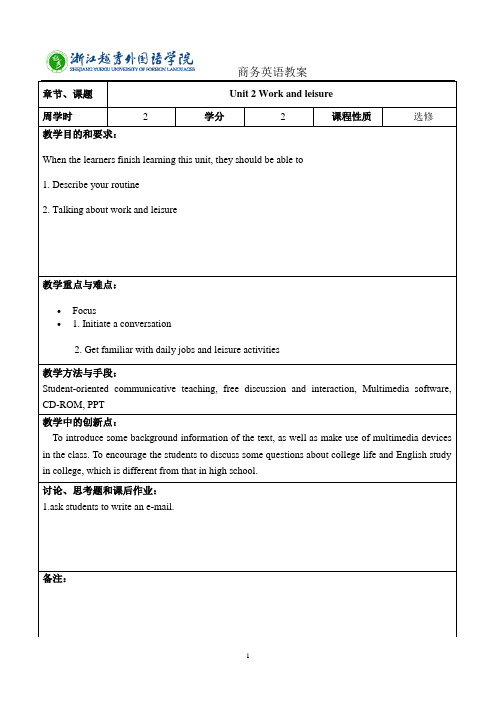
章节、课题Unit 2 Work and leisure周学时 2 学分 2 课程性质选修教学目的和要求:When the learners finish learning this unit, they should be able to1. Describe your routine2. Talking about work and leisure教学重点与难点:•Focus• 1. Initiate a conversation2. Get familiar with daily jobs and leisure activities教学方法与手段:Student-oriented communicative teaching, free discussion and interaction, Multimedia software, CD-ROM, PPT教学中的创新点:To introduce some background information of the text, as well as make use of multimedia devices in the class. To encourage the students to discuss some questions about college life and English study in college, which is different from that in high school.讨论、思考题和课后作业:1.ask students to write an e-mail.备注:Unit 1 IntroductionsPeriod 1 and 2I. Review1. Ask groups to write as many countries and nationalities as they can in three minutes.2. Compare with other groups.II. Lead-in: talking about students’ future jobsQ1: What do you think about your future job?Q2: Why do you choose this job?Talking about students’ future jobs is the first step to initiate a conversation. That's the skill we will practice in this unit.III. Starting up—part 1: workListen to four people. Make three word partnerships they use from the words in each box. (P14) After listening, students will learn to talk about your future jobs and list things that you think are important in a job (such as salary or holiday).Part APlay the recording from beginning to end and Pause after each speaker and elicit the answers.Part B1. Finish the exercise and check the answers around the class.2. Ask some students to read the phrases.Part C1. Work in pairs to make a list.2. Encourage Ss to compare their answers with others.III. VocabularyDays, months, and dates1. Ss are introduced to vocabulary for days, months, and dates.2. Focus on the tense of the present simple.VI. Part 2: leisure activities1.VocabularySs are introduced to vocabulary for leisure activities.•On the board write leisure activities. Divide the class into groups of three or four.Ask Ss to write down the related words as many as they can.•Get Ss to complete the exercise and check the answers around the class.•Divide the class into pairs. Tell student A to turn to page 136 and student B to turn to page 143. Explain to Ss that they should take turns to ask a question about a company. They should use the information in theActivity file to answer their partner’s questions.2. Language focus: Adverbs and expressions of frequencySs look at the examples of the use of adverbs and expressions of frequency.•Read the information in the Language focus box with the class.•Finish the exercises and check the answer.VII. Skills: Talking about work and leisureIn this section, Ss should practice their listening and speaking abilities.1. Ss listen to the tape and finish the exercises.2. Ss use the language to practice similar conversation.3. Culture Tip:It has never been easy to balance work and leisure. During the late twentieth century the concept of a job for life was largely replaced by the short-term contracts favoured by the enterprise culture. Some found themselves with too much free time on their hands when company restructures led to redundancies. Others saw leisure time shrink and working hours increase in exchange for greater financial rewards.Most conversations about work and leisure are not happened in formal situations.They are just some little dialodues in daily life.It is safe for someone new in the company to talk about leisure activities in free time.4. Functional Expressions:•Asking somebody about work and leisure activitiesWhat about your work?What about your studies?What do you do in your free time?What do you do at the weekend?What do you do in the evening?What do you do after work?•Responding to the questionsI like / love ...I don’t like ...I’m keen on ...He isn’t really keen on ...I really enjoy ...She doesn’t enjoy ...I’m interested in ...We aren’t interested in ...5. Communicative Activity: talking about your studies•Types of activity: whole class•Functions practiced: tell others about your studies and leisure activities in college; responding to othersDirections: Now you are enjoying your free time with your friends, work in groups to discussion by using the sentence patterns and functional expressions you’ve learned in this unit. Asking questions about your friends’ studies and leisure activities and responding to them.VIII. Case Study: Independent Film Company1. Role-playWork in pairs. Student A is an interviewer from Human Resources (turn to P137) and student B is an employee (turn to P145 and choose a role). Read your role card and preapre for the interview. After the reading, Ss are asked to do the interview.2. Writing•According to the the interview, ask student B to give the information which the employee thinks bad.•Work in pairs to list the working conditions they want to change (a model on page 131 is given).IX. Sum upIn this unit, we learnt:1. the related vocabulary about work and leisure activities;2. how to use simple present tense to describe daily things;3. how to talk about work and leisure activities.X. Assignment1. Role pay: group leader should see that every one in the group practices the skills of talk about work and leisure activities. (A demonstration is to be made in next session).2. Learn to write sentences by using simple present tense.。
体验商务英语2

Dear Sir,I want to apply for a job so I send you the letter. My name is Eva, I’m 42 years old. I was graduated fifteen years ago. I’m major in history. I have worked as a sales representative in Germany, the US and Poland over 15 years. I joined Fast-Track one year ago. I get a good sales record in my previous jobs. In my first year with Fast-Track my sales results have been satisfactory. I can speak fluent German, English and Polish.I know that the subsidiary’s recent sales results were poor. Sales revenue was 30% below target. I think one of the important reasons is the previous manager have no clear strategy for developing sales in the area. If I am successful, I will try to solve the problem.your signatureEvaI think the rank is c-b-d-a and country C is the most suitable location for the new jeans factory. The following is my analysis:8% per year is Country C’s growth rate and 10% is inflation rate. There are not much skilled labor available. They have very strong unions in the clothing industry. The wage rate is low but rising fast. The first tree elections for a democratic government were held last year. The interest rates are 4%-6% and the unemployment rate is 12%. There are limits on the profits which companies can take out of the country. Not much paperwork required for importing and exporting goods. There is a strong protest movement against international companies, which are accused of harming local firms. It’s small but well-managed airport and the road network needs investment.Country B’s interest rates are 8%-10% and the unemployment rate is 3%. It has a international airport but no seaport. There is a modern industrial country with many manufacturing industries. There are not a lot of skilled labors available, but they have strong unions. The wage rates is high. The country has a stable government. There are strict new laws on pollution. It’s so cool that here are no tax incentives for building new factories. The business tax is very high. It has a fully integrated road and rail network. It is a member of a large trading group.Compared with country B and C, Country D’s growth rate is 4% per year and inflation rate is 5%. 8%-12% is his interest rates and the unemployment rate is 12%. The government has started a big investment program for the transport system. It will take 5-10 years to complete. The government encourages the privatization of industry. There are large supplies of skilled workers, but they are not used to working long hours. They have strong unions but the wage rate is low. A lot of paperwork is required for new businesses. There are problems air and water pollution. Profits are tax free for the first three years after a factory has been built. Companies must pay 5% of their profits into a fund for training their workers. The government has started a big investment program for the transport system. It will take 5-10 years to complete.And the last one is country A. Country A’s growth rate is 2% per year and inflation rate is 5%. The government will contribute 30% towards the cost of a new factory. It has good rail network but poor roads and new international airport. The main seaport is in poor condition. There are unskilled labor available and a lot of training needed for jeans production. They have no unions in most industries. The country has a lot of debt and is trying to modernize its economy. The interest rates are 10%-15% and the unemployment rate is 25%-30%. The country has a military government. Bribery is common. Political problems: the people in the north want to become an independent state. But the wage rate is very low.。
体验商务英语market leader 第二册Unit Selling online
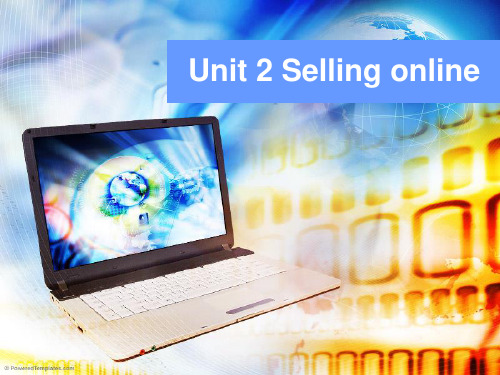
Quotation
This quotation means a bad business idea will not work any better just because it is being used as the basis for selling via the Internet. The technology will not, in itself, make up for any deficiencies.
Overview
Starting up (online shopping)
Vocabulary (Online Shopping)
Reading (Virtual Pocket
Me selling vs. high street selling)
Language Review (must, need to, Have to, should)
The Internet is an exciting tool that puts vast information at your fingertips. With a click of a mouse, it lets you buy an airline ticket, book a hotel, send flowers to a friend, or purchase your favorite stock. Good deals, convenience and choices abound on the Internet. But before you use all the Internet has to offer, be "cyber" smart and make your online experience safe.
Unit-2-Selling-online-体验商务英语综合教程2-
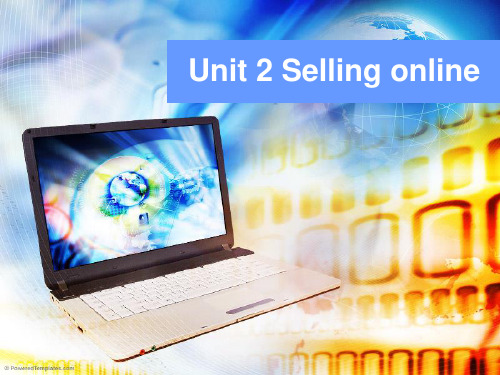
Online shopping websites
Starting up
C
Why do some people prefer not to buy goods and services online?
You may find that goods are not suitable when they arrive or get things you did not order.
Keep a paper trail. Print and save records of your online transactions, including the product description and price, the online receipt, and copies of every email you send or receive from the seller. Read your credit card statements as you receive them and be on the lookout for unauthorized charges.
Unit 2 Selling online
Quotation
This quotation means a bad business idea will not work any better just because it is being used as the basis for selling via the Internet. The technology will not, in itself, make up for any deficiencies.
The Internet is an exciting tool that puts vast information at your fingertips. With a click of a mouse, it lets you buy an airline ticket, book a hotel, send flowers to a friend, or purchase your favorite stock. Good deals, convenience and choices abound on the Internet. But before you use all the Internet has to offer, be "cyber" smart and make your online experience safe.
体验商务英语第二册Unit 2 Selling online

You may have security problems with using credit cards and find yourself paying for things you did not buy.
You may enjoy shopping in real shops. You may like the feeling of walking in the supermarket with a shopping cart.
warehouse
return
bargain
Vocabulary B Make phrases that match definitions 1 – 7.
Shopping
Online
credit card
cooling off
money back
method of
interest-free
out of
Online shopping
tips
Check out the terms of the deal, like refund policies and delivery dates. Can you return the item for a full refund if you’re not satisfied? If you return it, find out who pays the shipping costs or restocking fees, and when you will receive your order. Sellers are required to ship items as promised or within 30 days after the order date if no specific date is promised.
体验商务英语(market-leader)-第二册Unit-2-Selling-onlinePPT课

Know what it will cost. Check out websites that offer price comparisons and then, compare “apples to apples.” Factor shipping and handling — along with your needs and budget — into the total cost of the order. Do not send cash under any circumstances.
Unit 2 Selling online
Quotation
Bad ideas don’t get better online.
----IBM advertisement
Overview
Starting up (online shopping)
Vocabulary (Online Shopping)
Online shopping
tips
Check out the terms of the deal, like refund policies and delivery dates. Can you return the item for a full refund if you’re not satisfied? If you return it, find out who pays the shipping costs or restocking fees, and when you will receive your order. Sellers are required to ship items as promised or within 30 days after the order date if no specific date is promised.
体验商务英语2-Unit-2

Global reach
Personalization
Cost reduction
E-Commerce
Interactivity
Measurement
Discuss the questions
Some goods and services may be more suitable for selling online, for example: holidays and travel, where no physical delivery of goods is involved.
Some security problems may appear with using credit cards. So some people actually enjoy shopping in real shops.
Vocabulary
Choose the correct words to complete the sentences.
By implementing E-Commerce, you save money, are online 24hr a day, 7days a week, no traffic jams, shopping crowds, carrying overloaded heavy shopping bags etc, just more business, the easy way.
do shopping online? What problems are they? What are the advantages and disadvantages
of doing shopping online?
IBM advertisement
word版体验英语2(Unit2)
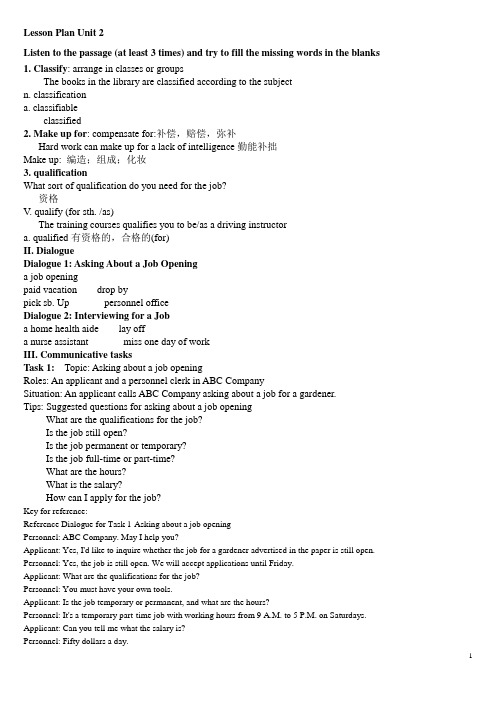
Lesson Plan Unit 2Listen to the passage (at least 3 times) and try to fill the missing words in the blanks 1. Classify: arrange in classes or groupsThe books in the library are classified according to the subjectn. classificationa. classifiableclassified2. Make up for: compensate for:补偿,赔偿,弥补Hard work can make up for a lack of intelligence勤能补拙Make up: 编造;组成;化妆3. qualificationWhat sort of qualification do you need for the job?资格V. qualify (for sth. /as)The training courses qualifies you to be/as a driving instructora. qualified有资格的,合格的(for)II. DialogueDialogue 1: Asking About a Job Openinga job openingpaid vacation drop bypick sb. Up personnel officeDialogue 2: Interviewing for a Joba home health aide lay offa nurse assistant miss one day of workIII. Communicative tasksTask 1: Topic: Asking about a job openingRoles: An applicant and a personnel clerk in ABC CompanySituation: An applicant calls ABC Company asking about a job for a gardener.Tips: Suggested questions for asking about a job openingWhat are the qualifications for the job?Is the job still open?Is the job permanent or temporary?Is the job full-time or part-time?What are the hours?What is the salary?How can I apply for the job?Key for reference:Reference Dialogue for Task 1-Asking about a job openingPersonnel: ABC Company. May I help you?Applicant: Yes, I'd like to inquire whether the job for a gardener advertised in the paper is still open. Personnel: Yes, the job is still open. We will accept applications until Friday.Applicant: What are the qualifications for the job?Personnel: You must have your own tools.Applicant: Is the job temporary or permanent, and what are the hours?Personnel: It's a temporary part-time job with working hours from 9 A.M. to 5 P.M. on Saturdays. Applicant: Can you tell me what the salary is?Personnel: Fifty dollars a day.Applicant: Sounds good. How can I apply for the job?Personnel: You may come in and get an application, then make an appointment for an interview.Applicant: Thank you for your information.Task 2: Topic: Interviewing for a jobRoles: An applicant and the personnel managerSituation: The personnel manager interviews the applicant about his application for a position in Public Relations.Tips: Suggested questions for a job interviewTell me some key facts about yourself.Do you have any experience in this type of work?Why did you leave your last job? Did you like it?Why do you think you would like to work for this company?What are your future career plans?What salary do you expect?Do you prefer working with others or by yourself?How long did you work for your last employer?How much education have you had?Key for reference:Reference Dialogue for Task 2- Interviewing for a jobInterviewer: Why do you think you would like to work for this company?Applicant: The research I have done leads me to believe that this company has the best reputation for quality.Interviewer: It sounds like you have done your homework. What experience do you have in this type of work?Applicant: I worked as a sales representative for two years where I received training in reception strategies.Interviewer: Why did you leave your last job?Applicant: I was laid off because our office closed.Interviewer: How would you evaluate your last firm?Applicant: It was an excellent company that afforded me many fine experiences.Interviewer: Why haven't you found a new position before now?Applicant: Finding a job is easy but finding the right job is more difficult.Interviewer: What are your weak points?Applicant: I am sometimes impatient and I get overly upset when we are late meeting a deadline.Passage AI. Warm-up activities to arouse students’ interest in learning the unit1. Do you often log on the Internet? What do you usually do online?Many students log on the Internet frequently. They may use the Internet to search for useful information they need, visit a chat room, email messages to their friends, or play video games.2. What is job application online? Have you ever tried it?Job application online means doing all the application on the Internet. One can fill in the application form and send it in an email form to potential employer's website, together with all necessary materials about oneself.3. Do you think the Internet will be used more extensively in your lifetime?Yes, it will continuously play more important role in the future.4. What is JOB-TRAK?It is an Internet website that lists as many as 45,000 job opportunities.5. How can you locate a potential job vacancy you are interested in online?You need to, first of all, punch击in a few keywords and start the searching machine.6. Does one need to have a lot of knowledge about the Internet before using it?Not necessarily so. According to Smith, the Internet was very easy to use. She found her job online with no training.7. How did Tools get the job as a marketing manager?He got the job because of his curiosity about the employment site named CareerBuilder.8. Why did Gragg apply to teach English in Japan?Because she wanted a change in her life.9. What is Dozlic's job now?He is now a driver at a local car dealership.10. What preparations did Mello make before she went for her interview?She searched the Internet for information about the financial performance of the company she was interested in, the salary she should ask for, and the possible living accommodations available to her there.11. Compare e-shopping and the shopping you do at a shopping mall. What are the strengths and limitations of each? There is no set answer for this question. You may answer it according to your own understanding.II. Summary of Passage ASince most students will choose to work after graduation, job-hunting is of great importance to them. They will write plenty of résumés about their education and send them to the companies they want to work for. It takes both time and energy to do so.Now, thanks to the development of the Internet, job-hunting becomes much easier. Job-hunters can find a job just by clicking a mouse on the computer. Many of them make their dream come true through the Internet.This article describes the experiences of several people who used online sources to look for new jobs. They turn to JOB-TRAK, CareerBuilder or Yahoo! to find desirable jobs.III. Related Information1)Northwestern UniversityNorthwestern University is a private, coeducational institution with campuses in Evanston and Chicago, Illinois. Illinois. The school was founded in 1851. It opened for instruction in 1855 with only ten students. Women were first admitted in 1869. The university confers bachelor's, master's, doctoral, and professional degrees in a wide range of fields.2)IllinoisIllinois is a state in the north central United States, in the heart of the Midwest. Illinois was little more than a vast wilderness 200 years ago. Since entering the Union on December 3, 1818, as the 21st state, the economy of Illinois has expanded until today. Illinois is one of the most productive agricultural and industrial states in the Union, and its economic influence now extends far beyond the Midwest.3)Jobtrak is a largest and popular job listing website for college students. Through its exclusive partnerships with career centers nationwide, allows you to reach job-seeking students from your choice of more than 1,000 colleges and university career centers.4)CareerBuilderCareerBuilder provide s online recruiting and service. Job seekers are exposed to more than 300,000 updated jobs, representing more than 25,000 of the top employers in almost every industry and field.CareerBuilder also makes it easy for employers to reach the audiences they want and hire the talent人才they need to.More than 6 million who visit CareerBuilder each month. In addition, employers have access to more than 4 million active resumes in CareerBuilder's extensive resume database.5)ChicagoThe city of Chicago is located in northeastern Illinois, on the shore of Lake Michigan and at the mouth of the Chicago River. The presence of numerous waterways and one of the nation’s busiest airports helps mak e Chicago a major shipping and transportation center.6)Houston ChronicleHouston is an integrated website for daily information, including news, sports, entertainment, AD 广告search, classified, etc.7)Yahoo!Yahoo is a web site that features a search engine and directory that helps users navigate the Web. It also aggregates content from a variety of sources, including news, financial information, and streaming media and offers registered users personalized Web pages, free e-mail, etc. The company has localized Web sites in 25 countries.8)MarylandThe Maryland colony was founded in 1634 and was named for the wife of English King Charles I, Queen Henrietta Maria. Colonial Maryland attracted many settlers and, as its economy prospered, so did its social, political, and cultural life. Maryland entered the Union on April 28, 1788, as the 7th of the original 13 states. IV. Language points: While discussing the text, teacher can refer to the following notes and choose from them when necessary.1. career: a job or profession for which one is trained and which one intends to follow for the whole of one's lifeThere are many more careers open to women now than fifty years ago.Florence Nightingale made nursing her career.2. placement. n. the act or an example of placing someone in position 安置The university offers a placement service for its graduates. ( = a service to find jobs for them)这所大学为毕业生提供就业服务。
- 1、下载文档前请自行甄别文档内容的完整性,平台不提供额外的编辑、内容补充、找答案等附加服务。
- 2、"仅部分预览"的文档,不可在线预览部分如存在完整性等问题,可反馈申请退款(可完整预览的文档不适用该条件!)。
- 3、如文档侵犯您的权益,请联系客服反馈,我们会尽快为您处理(人工客服工作时间:9:00-18:30)。
Combine words from boxes A and B. Make phrases that match definitions 1 to 7. B Guarantee /stock period /credit details /service 1. The time when you can change your mind and cancel an order payment
Five business benefits of ECommerce
Global reach
Personalization
Cost reduction
E-Commerce
Interactivity
Measurement
Discuss the questions
Some goods and services may be more suitable for selling online, for example: holidays and travel, where no physical delivery of goods is involved.
Some of the problems of e-commerce are the same as those for mail order: finding the goods are not suitable when they arrive or getting things you did not order. Some security problems may appear with using credit cards. So some people actually enjoy shopping in real shops.
Vocabulary
Choose the correct words to complete the sentences.
1 we offer a _____to customers who buy in bulk. A refund B discount C delivery
2 We ask customers who are not fully satisfied to ___goods within 7days. A discount B refund C return
Similarities
Customers satisfaction, quality, reliability of goods, etc. are just as important.
Customers want value for money in the same way (but may want even more value for money, in other words, low prices for the same goods, when buying online.)
Brainstorming
Warming -up Questions:
Do you do shopping online? What kind of goods do you usually buy online? Have you ever met any problems when you do shopping online? What problems are they? What are the advantages and disadvantages of doing shopping online?
What‟s B2B?
Business to business or B2B refers to electronic commerce between businesses rather than between a business and a consumer(B2C).
B2B businesses often deal with hundreds or even thousands of other businesses, either as customers or suppliers. Carrying out these transactions electronically provides vast competitive advantages over traditional methods. When implemented properly, ecommerce is often faster, cheaper and more convenient than the traditional methods of bartering goods and services.
Unit 2
Selling Online
Learning Objectives
Talking about selling online Vocabulary related to selling online Negotiating techniques Problem-solving abilities Business writing techniques by writing an e-mail
What‟s E-commerce?
By connecting to a standardized network we can find information, buy and sell quickly and easily, with lower process and administration cost.
Answer the questions
1.What was good about e-toys? It offers a good service. 2. What problems did e-toys have? The real reason for the failure of e-toys was that it ran out of money and therefore went into liquidation.
5 Goods are kept in our___ until ready for delivery A stock B storage C warehouse
6 Products and services offered at a large discount are generally a(n) ___. Key: A/C/B A sale B bargain C offer
A Credit card /cooling off Money back / method of Interest-free /out of after sales
2. The name, number and expiry date on your credit card 3. The way you choose to buy the goods you want
3 In order to get a full ____, customers must send back goods in the original packaging. A discount B refund C return
Key: B/C/B
Vocabulary
4 Goods will be ____within 24hrs of your order. A dispatched B purchased C exchanged
*Liquidation: n.If a company goes into liquidation, it stops operating and all its remaining assets are sold.
Listening C:
Key: 1 T 2 F 3 F 4 T
By implementing E-Commerce, you save money, are online 24hr a day, 7days a week, no traffic jams, shopping crowds, carrying overloaded heavy shopping bags etc, just more business, the easy way.
4. When you can pay some time after you buy, but at no extra cost
5. When the goods you require are not available 6. A promise to give your money back if you are not happy 7. The help you get from a company when you start to use their product Key: 1 cooling off period 4 interest-free credit 7 after sales service 2 credit card details 5 out of stock 3 method of payment 6 money back guarantee
Warming -up
the following page.
Brainstorming
Look at the pictures of the homepages in • Are you familiar with them? • What are the characteristics of them?
